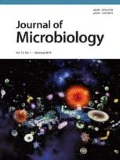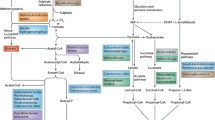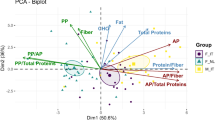Abstract
The objective of this study was to evaluate anti-obesity effects of kimchi microbial community (KMC) on obesity and gut microbiota using a high fat diet-induced mouse model compared to effects of a single strain. Administration of KMC decreased body weight, adipose tissue, and liver weight gains. Relative content of Muribaculaceae in the gut of the KMC-treated group was higher than that in the high-fat diet (HFD) group whereas relative contents of Akkermansiaceae, Coriobacteriaceae, and Erysipelotrichaceae were lower in KMC-treated group. Metabolic profile of blood was found to change differently according to the administration of KMC and a single strain of Lactobacillus plantarum. Serum metabolites significantly increased in the HFD group but decreased in the KMC-treated group included arachidic acid, stearic acid, fumaric acid, and glucose, suggesting that the administration of KMC could influence energy metabolism. The main genus in KMC was not detected in guts of mice in KMC-treated group. Since the use of KMC has advantages in terms of safety, it has potential to improve gut microbial community for obese people.
Similar content being viewed by others
References
Aballay, L.R., Eynard, A.R., Díaz, M.P., Navarro, A., and Muñoz, S.E. 2013. Overweight and obesity: a review of their relationship to metabolic syndrome, cardiovascular disease, and cancer in South America. Nutr. Rev. 71, 168–179.
Ahn, I.S., Do, M.S., Kim, S.O., Jung, H.S., Kim, Y.I., Kim, H.J., and Park, K.Y. 2006. Antiobesity effect of Kochujang (Korean fermented red pepper paste) extract in 3T3-L1 adipocytes. J. Med. Food 9, 15–21.
An, H.M., Park, S.Y., Lee, D.K., Kim, J.R., Cha, M.K., Lee, S.W., Lim, H.T., Kim, K.J., and Ha, N.J. 2011. Antiobesity and lipid-lowering effects of Bifidobacterium spp. in high fat diet-induced obese rats. Lipids Health Dis. 10, 116.
Andersson, U., Bränning, C., Ahrné, S., Molin, G., Alenfall, J., Onning, G., Nyman, M., and Holm, C. 2010. Probiotics lower plasma glucose in the high-fat fed C57BL/6J mouse. Benef. Microbes 1, 189–196.
Brusaferro, A., Cozzali, R., Orabona, C., Biscarini, A., Farinelli, E., Cavalli, E., Grohmann, U., Principi, N., and Esposito, S. 2018. Is it time to use probiotics to prevent or treat obesity? Nutrients 10, 1613.
Calvani, R., Miccheli, A., Capuani, G., Tomassini Miccheli, A., Puccetti, C., Delfini, M., Iaconelli, A., Nanni, G., and Mingrone, G. 2010. Gut microbiome-derived metabolites characterize a peculiar obese urinary metabotype. Int. J. Obes. 34, 1095–1098.
Castaner, O., Goday, A., Park, Y.M., Lee, S.H., Magkos, F., Shiow, S.A.T.E., and Schröder, H. 2018. The gut microbiome profile in obesity: a systematic review. Int. J. Endocrinol. 2018, 4095789.
Cha, Y.S., Park, Y., Lee, M., Chae, S.W., Park, K., Kim, Y., and Lee, H.S. 2014. Doenjang, a Korean fermented soy food, exerts antiobesity and antioxidative activities in overweight subjects with the PPAR-γ2 C1431T polymorphism: 12-week, double-blind randomized clinical trial. J. Med. Food 17, 119–127.
Chen, Y.T., Yang, N.S., Lin, Y.C., Ho, S.T., Li, K.Y., Lin, J.S., Liu, J.R., and Chen, M.J. 2018. A combination of Lactobacillus mali APS1 and dieting improved the efficacy of obesity treatment via manipulating gut microbiome in mice. Sci. Rep. 8, 6153.
Choi, I.H., Noh, J.S., Han, J.S., Kim, H.J., Han, E.S., and Song, Y.O. 2013. Kimchi, a fermented vegetable, improves serum lipid profiles in healthy young adults: randomized clinical trial. J. Med. Food 16, 223–229.
Clarke, S.F., Murphy, E.F., Nilaweera, K., Ross, P.R., Shanahan, F., O’Toole, P.W., and Cotter, P.D. 2012. The gut microbiota and its relationship to diet and obesity: new insights. Gut Microbes 3, 186–202.
Cui, H.H., Chen, C.L., Wang, J.D., Yang, Y.J., Cun, Y., Wu, J.B., Liu, Y.H., Dan, H.L., Jian, Y.T., and Chen, X.Q. 2004. Effects of probiotic on intestinal mucosa of patients with ulcerative colitis. World J. Gastroenterol. 10, 1521–1525.
Cui, M., Kim, H.Y., Lee, K.H., Jeong, J.K., Hwang, J.H., Yeo, K.Y., Ryu, B.H., Choi, J.H., and Park, K.Y. 2015. Antiobesity effects of kimchi in diet-induced obese mice. J. Ethn. Foods 2, 137–144.
Dahiya, D.K., Puniya, M., Shandilya, U.K., Dhewa, T., Kumar, N., Kumar, S., Punjya, A.K., and Shukla, P. 2017. Gut microbiota modulation and its relationship with obesity using prebiotic fibers and probiotics: a review. Front. Microbiol. 8, 563.
Davis, C.D. 2016. The gut microbiome and its role in obesity. Nutr. Today 51, 167–174.
Delzenne, N.M., Neyrinck, A.M., Bäckhed, F., and Cani, P.D. 2011. Targeting gut microbiota in obesity: effects of prebiotics and probiotics. Nat. Rev. Endocrinol. 7, 639–646.
Ding, Y., Song, Z., Li, H., Chang, L., Pan, T., Gu, X., He, X., and Fan, Z. 2019. Honokiol ameliorates high-fat-diet-induced obesity of different sexes of mice by modulating the composition of the gut microbiota. Front. Immunol. 10, 2800.
Hou, D., Zhao, Q., Yousaf, L., Khan, J., Xue, Y., and Shen, Q. 2020. Consumption of mung bean (Vigna radiata L.) attenuates obesity, ameliorates lipid metabolic disorders and modifies the gut microbiota composition in mice fed a high-fat diet. J. Funct. Foods 64, 103687.
Jung, J.Y., Lee, S.H., and Jeon, C.O. 2014. Kimchi microflora: history, current status, and perspectives for industrial kimchi production. Appl. Microbiol. Biotechnol. 98, 2385–2393.
Kaakoush, N.O. 2015. Insights into the role of Erysipelotrichaceae in the human host. Front. Cell. Infect. Microbiol. 5, 84.
Kadooka, Y., Sato, M., Imaizumi, K., Ogawa, A., Ikuyama, K., Akai, Y., Okano, M., Kagoshima, M., and Tsuchida, T. 2010. Regulation of abdominal adiposity by probiotics (Lactobacillus gasseri SBT2055) in adults with obese tendencies in a randomized controlled trial. Eur. J. Clin. Nutr. 64, 636–643.
Kim, S.M. 2015. Obesity and dysbiosis. Korean J. Obes. 24, 121–125.
Kim, E.K., An, S.Y., Lee, M.S., Kim, T.H., Lee, H.K., Hwang, W.S., Choe, S.J., Kim, T.Y., Han, S.J., Kim, H.J., et al. 2011. Fermented kimchi reduces body weight and improves metabolic parameters in overweight and obese patients. Nutr. Res. 31, 436–443.
Kruis, W., Frič, P., Pokrotnieks, J., Lukáš, M., Fixa, B., Kaščák, M., Kamm, M.A., Weismueller, J., Beglinger, C., Stolte, M., et al. 2004. Maintaining remission of ulcerative colitis with the probiotic Escherichia coli Nissle 1917 is as effective as with standard mesalazine. Gut 53, 1617–1623.
Kumar, N., Tomar, S.K., Thakur, K., and Singh, A.K. 2017. The ameliorative effects of probiotic Lactobacillus fermentum strain RS-2 on alloxan induced diabetic rats. J. Funct. Foods 28, 275–284.
Lee, B.H., Lo, Y.H., and Pan, T.M. 2013. Anti-obesity activity of Lactobacillus fermented soy milk products. J. Funct. Foods 5, 905–913.
Park, D.Y., Ahn, Y.T., Park, S.H., Huh, C.S., Yoo, S.R., Yu, R., Sung, M.K., McGregor, R.A., and Choi, M.S. 2013. Supplementation of Lactobacillus curvatus HY7601 and Lactobacillus plantarum KY1032 in diet-induced obese mice is associated with gut microbial changes and reduction in obesity. PLoS ONE 8, e59470.
Park, S. and Bae, J.H. 2015. Probiotics for weight loss: a systematic review and meta-analysis. Nutr. Res. 35, 566–575.
Park, E.J., Chun, G., Cha, C.J., Park, W.S., Jeon, C.O., and Bae, J.W. 2012. Bacterial community analysis during fermentation of ten representative kinds of kimchi with barcoded pyrosequencing. Food Microbiol. 30, 197–204.
Park, S., Ji, Y., Jung, H.Y., Park, H., Kang, J., Choi, S.H., Shin, H., Hyun, C.K., Kim, K.T., and Holzapfel, W.H. 2017. Lactobacillus plantarum HAC01 regulates gut microbiota and adipose tissue accumulation in a diet-induced obesity murine model. Appl. Microbiol. Biotechnol. 101, 1605–1614.
Park, J.E., Oh, S.H., and Cha, Y.S. 2014. Lactobacillus brevis OPK-3 isolated from kimchi inhibits adipogenesis and exerts anti-inflammation in 3T3-L1 adipocyte. J. Sci. Food Agric. 94, 2514–2520.
Park, S.E., Seo, S.H., Kim, E.J., Park, D.H., Park, K.M., Cho, S.S., Son, H.S. 2019. Metabolomic approach for discrimination of cultivation age and ripening stage in ginseng berry using gas chromatography-mass spectrometry. Molecules 24, 3837.
Peters, B.A., Shapiro, J.A., Church, T.R., Miller, G., Trinh-Shevrin, C., Yuen, E., Friedlander, C., Hayes R.B., and Ahn, J. 2018. A taxonomic signature of obesity in a large study of American adults. Sci. Rep. 8, 9749.
Qin, Y., Roberts, J.D., Grimm, S.A., Lih, F.B., Deterding, L.J., Li, R., Chrysovergis, K., and Wade, P.A. 2018. An obesity-associated gut microbiome reprograms the intestinal epigenome and leads to altered colonic gene expression. Genome Biol. 19, 7.
Raoult, D. 2009. Probiotics and obesity: a link? Nat. Rev. Microbiol. 7, 616.
Rössner, S. 2002. Obesity: the disease of the twenty-first century. Int. J. Obes. 26, S2–S4.
Rouxinol-Dias, A.L., Pinto, A.R., Janeiro, C., Rodrigues, D., Moreira, M., Dias, J., and Pereira, P. 2016. Probiotics for the control of obesity–Its effect on weight change. Porto Biomed. J. 1, 12–24.
Sakai, T., Taki, T., Nakamoto, A., Shuto, E., Tsutsumi, R., Toshimitsu, T., Makino, S., and Ikegami, S. 2013. Lactobacillus plan-tarum OLL2712 regulates glucose metabolism in C57BL/6 mice fed a high-fat diet. J. Nutr. Sci. Vitaminol. 59, 144–147.
Shen, Z.H., Zhu, C.X., Quan, Y.S., Yang, Z.Y., Wu, S., Luo, W.W., Tan, B., and Wang, X.Y. 2018. Relationship between intestinal microbiota and ulcerative colitis: mechanisms and clinical application of probiotics and fecal microbiota transplantation. World J. Gastroenterol. 24, 5–14.
Son, S.H., Jeon, H.L., Yang, S.J., Lee, N.K., and Paik, H.D. 2017. In vitro characterization of Lactobacillus brevis KU15006, an isolate from kimchi, reveals anti-adhesion activity against foodborne pathogens and antidiabetic properties. Microb. Pathog. 112, 135–141.
Sood, A., Midha, V., Makharia, G.K., Ahuja, V., Singal, D., Goswami, P., and Tandon, R.K. 2009. The probiotic preparation, VSL# 3 induces remission in patients with mild-to-moderately active ulcerative colitis. Clin. Gastroenterol. Hepatol. 7, 1202–1209.
Timmerman, H.M., Koning, C.J.M., Mulder, L., Rombouts, F.M., and Beynen, A.C. 2004. Monostrain, multistrain and multispecies probiotics-a comparison of functionality and efficacy. Int. J. Food Microbiol. 96, 219–233.
Turnbaugh, P.J., Bäckhed, F., Fulton, L., and Gordon, J.I. 2008. Diet-induced obesity is linked to marked but reversible alterations in the mouse distal gut microbiome. Cell Host Microbe 3, 213–223.
Turnbaugh, P.J., Ley, R.E., Mahowald, M.A., Magrini, V., Mardis, E.R., and Gordon, J.I. 2006. An obesity-associated gut microbiome with increased capacity for energy harvest. Nature 444, 1027–1031.
Wang, J., Tang, H., Zhang, C., Zhao, Y., Derrien, M., Rocher, E., van Hylckama Vlieg, J.E.T., Strissel, K., Zhao L., Obin, M., et al. 2015. Modulation of gut microbiota during probiotic-mediated attenuation of metabolic syndrome in high fat diet-fed mice. ISME J. 9, 1–15.
Watson, R.R. and Preedy, V.R. 2015. Probiotics, prebiotics, and synbiotics: Bioactive foods in health promotion. Academic Press, San Diego, California, USA.
Yin, Y.N., Yu, Q.F., Fu, N., Liu, X.W., and Lu, F.G. 2010. Effects of four Bifidobacteria on obesity in high-fat diet induced rats. World J. Gastroenterol. 16, 3394–3401.
Yoo, S.R., Kim, Y.J., Park, D.Y., Jung, U.J., Jeon, S.M., Ahn, Y.T., Huh, C.S., McGregor, R., and Choi, M.S. 2013. Probiotics L. plantarum and L. curvatus in combination alter hepatic lipid metabolism and suppress diet-induced obesity. Obesity 21, 2571–2578.
Yoon, S.H., Ha, S.M., Kwon, S., Lim, J., Kim, Y., Seo, H., and Chun, J. 2017. Introducing EzBioCloud: a taxonomically united database of 16S rRNA gene sequences and whole-genome assemblies. Int. J. Syst. Evol. Microbiol. 67, 1613–1617.
Yu, M.H., Lee, H.J., Im, H.G., Hwang, B.M.H., Kim, H.J., and Lee, I.S. 2005. The effects of kimchi with Monascus purpureus on the body weight gain and lipid metabolism in rats fed high fat diet. J. Life Sci. 15, 536–541.
Zhang, X., Wu, Q., Zhao, Y., Aimy, A., and Yang, X. 2019. Consumption of post-fermented Jing-Wei Fuzhuan brick tea alleviates liver dysfunction and intestinal microbiota dysbiosis in high fructose diet-fed mice. RSC Adv. 9, 17501–17513.
Zuo, T., Wong, S.H., Cheung, C.P., Lam, K., Lui, R., Cheung, K., Zhang, F., Tang, W., Ching, J.Y.L., Wu, J.C.Y., et al. 2018. Gut fungal dysbiosis correlates with reduced efficacy of fecal microbiota transplantation in Clostridium difficile infection. Nat. Commun. 9, 3663.
Acknowledgments
This work was supported by the National Research Foundation of Korea (NRF) grant funded by the Korea government (No. 2019R1C1C1002208).
Author information
Authors and Affiliations
Corresponding authors
Additional information
Conflict of Interest
The authors declared that they have no conflict of interest.
Supplemental material for this article may be found at http://www.springerlink.com/content/120956.
Electronic Supplementary Material
Rights and permissions
About this article
Cite this article
Park, SE., Kwon, S.J., Cho, KM. et al. Intervention with kimchi microbial community ameliorates obesity by regulating gut microbiota. J Microbiol. 58, 859–867 (2020). https://doi.org/10.1007/s12275-020-0266-2
Received:
Revised:
Accepted:
Published:
Issue Date:
DOI: https://doi.org/10.1007/s12275-020-0266-2




